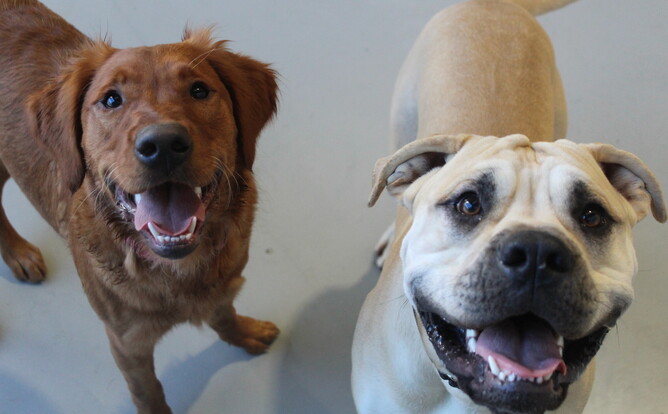Doggy Daycare is growing in popularity in New Zealand, people are busier and smaller housing means people have smaller back yards and dog owners are also recognising the importance of having well socialised dogs.
The aim of doggy day care is to create a fun, safe environment where you can drop your dog to make your life easier and be a positive experience for your dog. Daycares are a controlled environment versus being out and about in public where there are unknown factors. Many dogs have a fantastic experience and it is great for their socialisation, development and energy levels.
When choosing a doggy daycare how do you know what to ask? Here a few things to consider before you choose a daycare for your fur-baby:
- Vaccinations – a pre-play vaccination check should be performed BEFORE the dog is in contact with other dogs at the facility. The current international vet standards are: core vaccinations (DHPP) every 3 years, Lepto and Kennel Cough annually. After the pre-entry check, what is the ongoing management system to ensure these are kept up to date?
- Staff training - Staff members should be well educated on dog behaviour, dog body language, canine CPR, health, play style and behaviour management. Do the staff receive ongoing training? Do senior staff monitor untrained staff before they are left with any groups of dogs?
- Are temperament evaluations performed before dogs join the facility? It is not enough to simply test a dog for aggression - to ensure a safe facility dogs should also be tested for other things such as separation anxiety, confidence levels and toy possessiveness. The tests should be fully explained to you and the results communicated. If the initial evaluation goes well the dog should then be observed over several hours. If your dog is overwhelmed, stressed or unhappy the staff should be able to give you advice on if they can overcome this. A reputable doggy daycare will let an owner know if day-care is not the best option for your dog based on their behaviour. A gradual introduction to the facility may be suggested, this may not be that convenient for the owner, however sets the dogs up to succeed within the environment.
- How do they group the dogs? Trained professionals will group the dogs by temperament, personality and size. You don’t want a highly energised large dog in with a low energy tiny dog. It is important for small dogs to interact with big dogs and vice versa as when we take our dogs out and about we can’t control who they run into.
- Who supervises the dogs? Dogs should be supervised at all times by trained staff.
- How do they introduce new dogs to the facility? New dogs should be slowly introduced to the dogs at the facility, keeping the whole experience positive.
- There is little study in New Zealand around the handler to dog ratio, and therefore it can be quite hard to get an answer on what the recommendations are. The handler to dog ratio is very dependent on the type, size, and mix of dogs in an enclosure. You should ask to see the facility and make sure you are comfortable that there are enough ares to mix the dogs safely. When taking the dogs out of the facility e.g. to the park, ask how many staff go with each group?
- Where can the dogs rest if they have had enough? Do they have dedicated rest times throughout the day? This is important for your dog’s wellbeing – puppies in particular don’t know how to regulate their own play. Like children, tired dogs can cause fights so it’s important they have rest times.
- Dogs are exercising and running around having fun so there is an element of risk for injury just like a child at school but what does the facility do to limit the risk and what is their dog injury rate?
- What do the dogs do throughout the day? Are there any extra activities, like games, outings, walks or mental stimulation? The staff should be able to give you details of the daily schedule. When looking after groups of dogs there needs to be a very high level of organisation.
- What range of services do they offer? If the facility offers a range of services such as swimming, field trips, training, overnights, bathing, walks and classes this can be easy for the owners as well as provide continuity of staff for the dogs.
- What are the safety procedures for dogs and staff?
- Is the fencing secure – do they have a double gate system? How high is the perimeter fencing?
- Are you able to view the dogs in day care regularly? Insist on viewing the facility beforehand (be conscious some have mat times so go outside these times). If they won’t show you the facility – don’t leave your dog there.
- What are the cleaning policies? What do they use to clean and how often is this done?
- If feeding is required, do they feed dogs separately?
- Do the dogs seem happy? Dogs can’t talk in human language, but body language is key, if your dog does not want to go into the facility, ask yourself why (exception may be when they first start while they are getting used to the new place but they should settle in reasonably quickly if introductions are done right). If your dog has been fine and then suddenly does not want to go in, I would be asking the facility for an explanation, if it doesn’t feel right stop going.
- Are the staff interacting with the dogs? A big warning sign is if the staff have phones out in the play areas or standing in the play areas with coffee cups – you need your attention to be 100% on the dogs if you are supervising groups.
- What are the behaviour management policies – how do they spot problems and deal with them? Like schools there must be order however it needs to be done correctly.
- Education and development - Does the daycare offer dog training? If not do they have access to a trainer and behaviourist to help with any problems? If they don’t have an onsite qualified behaviourist how do they keep their staff knowledge up to date?
- Do they communicate with you when there are problems, or are you just told your dog is “fine and had fun” on pick up?
- Do they allow excessive barking? There’s 3 main reasons dogs bark - over excited, bored or under stress. Observe barking levels, not just on pick up and drop off when they are most excited, but during their day too.
- Testimonials from other clients are useful so you know others have had a great experience at a doggy day care. Check them out online or ask to speak to other clients.
Not all dogs are suitable for the day care environment, some dogs (just like people) like a quieter environment and would prefer staying home. If your dog does not feel comfortable in a doggy daycare, it’s not a bad thing, just a preference. A well-run business with qualified staff will advise you if your dog is not suited to the day care environment. This may be disappointing to the owner, however, a good day care will be honest about how the experience is for your dog.




